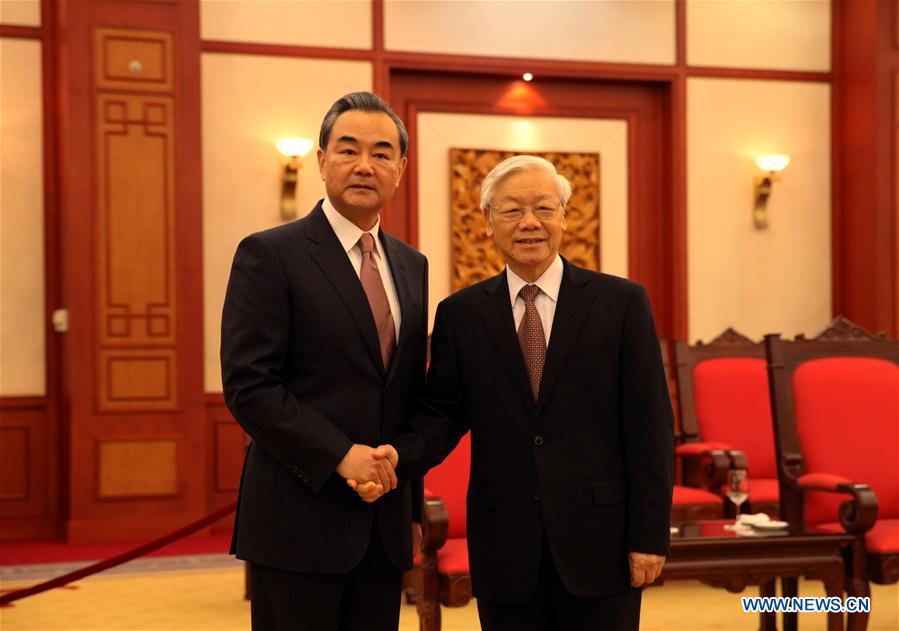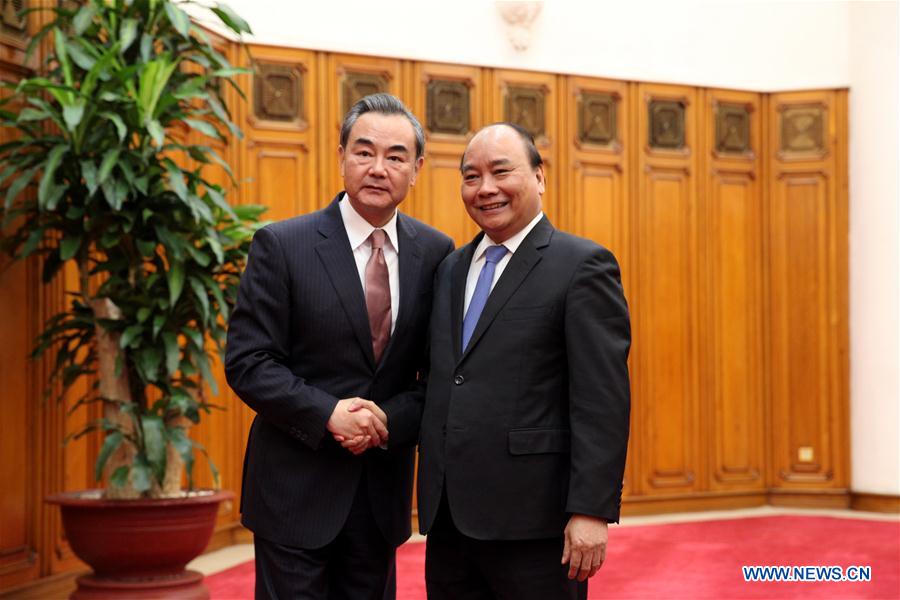Vietnam, China vow to join hands to realize common prosperity
Vietnam and China have pledged in Hanoi to seize the opportunities brought about by China's Belt and Road Initiative to achieve common development and common prosperity.
|
General Secretary of the Communist Party of Vietnam Central Committee Nguyen Phu Trong(R) meets with visiting Chinese Foreign Minister Wang Yi, in Hanoi, Vietnam, Nov. 3, 2017. [Photo/Xinhua] |
The pledge came when General Secretary of the Communist Party of Vietnam Central Committee Nguyen Phu Trong and Vietnamese Prime Minister Nguyen Xuan Phuc met with visiting Chinese Foreign Minister Wang Yi separately.
In his meeting with the Chinese foreign minister on Friday, Nguyen Phu Trong congratulated Xi Jinping on his re-election as the general secretary of the Central Committee of the Communist Party of China and the elevation of the Xi Jinping Thought on Socialism with Chinese Characteristics for a New Era into the party's guiding principles.
Nguyen Phu Trong said his country will learn from China's successful experiences to further push forward the development of its own socialist cause.
He said the forthcoming visit by Chinese President Xi Jinping to Vietnam shows that China attaches great importance to the comprehensive strategic cooperative partnership between the two countries and Vietnam is willing to work with China to further deepen cooperation between the two sides in all fields.
For his part, Wang Yi said Chinese President Xi Jinping, while meeting with Hoang Binh Quan, special envoy of General Secretary of the Communist Party of Vietnam Central Committee Nguyen Phu Trong days ago, noted that remaining true to the original aspiration and keeping the mission firmly in mind also apply to the development of China-Vietnam relations, both sides shroud view the China-Vietnam relations from a higher vantage point and a deeper level and firmly promote the building of a community of shared future.
The two countries should elevate the bilateral ties to a new high and open a new chapter for the comprehensive strategic cooperative partnership between the two countries by building a community of shared future, Wang said.
|
Vietnamese Prime Minister Nguyen Xuan Phuc(R) meets with visiting Chinese Foreign Minister Wang Yi, in Hanoi, Vietnam, Nov. 3, 2017. [Photo/Xinhua] |
Also on Friday, Vietnamese Prime Minister Nguyen Xuan Phuc met with the Chinese foreign minister. The prime minister said Vietnam and China are both socialist countries and Vietnam is willing to unswervingly stride forward along the socialist road with China.
He said to further consolidate the traditional and friendly ties and deepen cooperation in all sectors between the two sides are in the interest of both peoples and no forces can undermine the development of bilateral ties.
Wang said China's Belt and Road Initiative creates important opportunities for China and Vietnam to carry out pragmatic cooperation, which will accelerate the achievement of common development and common prosperity between the two sides.
In his meeting with the Chinese foreign minister on Thursday, Vietnamese Deputy Prime Minister and Foreign Minister Pham Binh Minh said Xi's forthcoming visit to Vietnam will become a new milestone in the communication history of the two parties and the two countries.
Pham Binh Minh said Vietnam values the friendly ties with China and will work with China to ensure Xi's visit a successful one.
Wang said Xi's forthcoming visit to Vietnam is the most important political agenda in the bilateral ties this year.
The Chinese foreign minister hoped that the visit will determine the development direction of the relations between the two parties and the two countries.
Wang believed that the visit will further consolidate the political and strategic mutual trust and the basis of public opinion of the friendly ties between the two countries.

